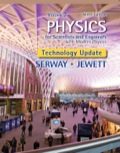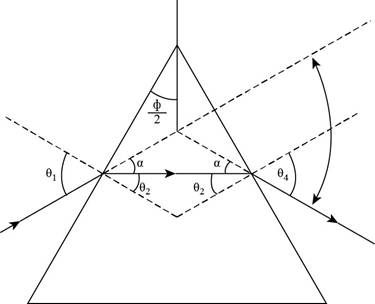
Concept explainers
A triangular glass prism with apex angle 60.0° has an index of refraction of 1.50. (a) Show that if its angle of incidence on the first surface is θ1 = 48.6°, light will pass symmetrically through the prism as shown in Figure 34.16. (b) Find the angle of deviation δmin for θ1 = 48.6°. (c) What If? Find the angle of deviation if the angle of incidence on the first surface is 45.6°. (d) Find the angle of deviation if θ1 = 51.6°.
(a)
To show: Light will pass symmetrically through the prism if the angle of incidence on the first surface
Answer to Problem 35.28P
Explanation of Solution
Given information: The apex angle is
The diagram for the given condition is shown below.

Figure (1)
Apply Snell’s law of refraction at the first interface.
The Snell’s law of refraction is,
Here,
Substitute
Apply Snell’s law of refraction at the second interface.
The Snell’s law of refraction is,
Here,
Substitute
Since,
Conclusion:
Therefore, the light will pass symmetrically through the prism.
(b)
Answer to Problem 35.28P
Explanation of Solution
Given information: The apex angle is
The angle of minimum deviation
Here,
Substitute
Conclusion:
Therefore, the orientation angle in the proper frame is
(c)
Answer to Problem 35.28P
Explanation of Solution
Given information: The apex angle is
Apply Snell’s law of refraction at the first interface.
The Snell’s law of refraction is,
Here,
Substitute
Apply Snell’s law of refraction at the second interface.
The Snell’s law of refraction is,
Here,
Substitute
The angle of minimum deviation
Here,
Substitute
Conclusion:
Therefore, the orientation angle in the proper frame is
(d)
Answer to Problem 35.28P
Explanation of Solution
Given information: The apex angle is
Apply Snell’s law of refraction at the first interface.
The Snell’s law of refraction is,
Here,
Substitute
Apply Snell’s law of refraction at the second interface.
The Snell’s law of refraction is,
Here,
Substitute
The angle of minimum deviation
Here,
Substitute
Conclusion:
Therefore, the orientation angle in the proper frame is
Want to see more full solutions like this?
Chapter 35 Solutions
EBK PHYSICS FOR SCIENTISTS AND ENGINEER
- A certain brand of freezer is advertised to use 730 kW h of energy per year. Part A Assuming the freezer operates for 5 hours each day, how much power does it require while operating? Express your answer in watts. ΜΕ ΑΣΦ ? P Submit Request Answer Part B W If the freezer keeps its interior at a temperature of -6.0° C in a 20.0° C room, what is its theoretical maximum performance coefficient? Enter your answer numerically. K = ΜΕ ΑΣΦ Submit Request Answer Part C What is the theoretical maximum amount of ice this freezer could make in an hour, starting with water at 20.0°C? Express your answer in kilograms. m = Ο ΑΣΦ kgarrow_forwardDescribe the development of rational choice theory in sociology. Please includearrow_forwardA-E pleasearrow_forward
- A 11.8 L gas tank containing 3.90 moles of ideal He gas at 26.0°C is placed inside a completely evacuated insulated bell jar of volume 39.0 L .A small hole in the tank allows the He to leak out into the jar until the gas reaches a final equilibrium state with no more leakage. Part A What is the change in entropy of this system due to the leaking of the gas? ■ ΜΕ ΑΣΦ AS = ? J/K Submit Request Answer Part B Is the process reversible or irreversible?arrow_forwardA-E pleasearrow_forwardThree moles of an ideal gas undergo a reversible isothermal compression at 20.0° C. During this compression, 1900 J of work is done on the gas. For related problem-solving tips and strategies, you may want to view a Video Tutor Solution of Entropy change in a free expansion. Part A What is the change of entropy of the gas? ΤΕ ΑΣΦ AS = Submit Request Answer J/Karrow_forward
- 5.97 Block A, with weight 3w, slides down an inclined plane S of slope angle 36.9° at a constant speed while plank B, with weight w, rests on top of A. The plank is attached by a cord to the wall (Fig. P5.97). (a) Draw a diagram of all the forces acting on block A. (b) If the coefficient of kinetic friction is the same between A and B and between S and A, determine its value. Figure P5.97 B A S 36.9°arrow_forwardPlease take your time and solve each part correctly please. Thank you!!arrow_forwardhelp me answer this with explanations! thanks so mucharrow_forward
- No chatgpt pls will upvote Alreadyarrow_forwardWhat fuel economy should be expected from a gasoline powered car that encounters a total of 443N of resistive forces while driving down the road? (Those forces are from air drag, rolling resistance and bearing losses.) Assume a 30% thermodynamic efficiency.arrow_forwardNo chatgpt pls will upvotearrow_forward
 College PhysicsPhysicsISBN:9781285737027Author:Raymond A. Serway, Chris VuillePublisher:Cengage Learning
College PhysicsPhysicsISBN:9781285737027Author:Raymond A. Serway, Chris VuillePublisher:Cengage Learning College PhysicsPhysicsISBN:9781305952300Author:Raymond A. Serway, Chris VuillePublisher:Cengage Learning
College PhysicsPhysicsISBN:9781305952300Author:Raymond A. Serway, Chris VuillePublisher:Cengage Learning Physics for Scientists and EngineersPhysicsISBN:9781337553278Author:Raymond A. Serway, John W. JewettPublisher:Cengage Learning
Physics for Scientists and EngineersPhysicsISBN:9781337553278Author:Raymond A. Serway, John W. JewettPublisher:Cengage Learning Physics for Scientists and Engineers with Modern ...PhysicsISBN:9781337553292Author:Raymond A. Serway, John W. JewettPublisher:Cengage Learning
Physics for Scientists and Engineers with Modern ...PhysicsISBN:9781337553292Author:Raymond A. Serway, John W. JewettPublisher:Cengage Learning Physics for Scientists and Engineers: Foundations...PhysicsISBN:9781133939146Author:Katz, Debora M.Publisher:Cengage Learning
Physics for Scientists and Engineers: Foundations...PhysicsISBN:9781133939146Author:Katz, Debora M.Publisher:Cengage Learning Physics for Scientists and Engineers, Technology ...PhysicsISBN:9781305116399Author:Raymond A. Serway, John W. JewettPublisher:Cengage Learning
Physics for Scientists and Engineers, Technology ...PhysicsISBN:9781305116399Author:Raymond A. Serway, John W. JewettPublisher:Cengage Learning





